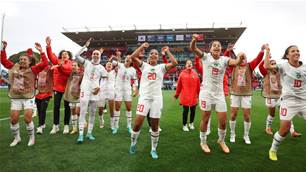ENGLAND'S hopes of winning the contest for the 2018 World Cup have been given a major boost after FIFA president Sepp Blatter cast doubt on whether joint bids would be allowed.
Spain/Portugal and Holland/Belgium are both preparing joint bids to rival England's campaign but current FIFA rules do not permit them.
Speaking at a news conference in Asuncion, Paraguay, Blatter said: "As long as we have single-country bids which provide all the necessary guarantees we will reject co-hosting bids."
PA Sport revealed yesterday that current FIFA rules still outlaw joint bids by two or more countries.
Chuck Blazer, a FIFA executive committee member from the USA, also confirmed a new ruling would be needed if this was to change. He said the experience of the 2002 World Cup in Korea and Japan had led to the executive committee imposing the original ban.
Blazer, one of the 24-man committee who will decide on the 2018 and 2022 hosts in just under two years' time, told PA Sport: "For the 2010 bid, the executive committee at that time decided we would not accept joint bids after the experience of 2002, which manifested itself as a much more difficult logistical situation with two countries.
"That was the last position on the matter taken by FIFA's executive committee. For 2014, the situation did not come up as there was just one bid, from Brazil.
"As things stand in regard to bidding, if there are an adequate number of single bids we do not accept joint bids.
"If we are going to do anything different it will have to be addressed at our next meeting in March."
There will certainly be plenty of single bids - England, USA, Russia, Japan, Qatar, Australia and Indonesia have all expressed interest in bidding.
FIFA announced last month there will be a simultaneous bidding process for the 2018 and 2022 tournaments, though a country will not be considered for 2022 if its continent is hosting 2018.
Speaking at a news conference in Asuncion, Paraguay, Blatter said: "As long as we have single-country bids which provide all the necessary guarantees we will reject co-hosting bids."
PA Sport revealed yesterday that current FIFA rules still outlaw joint bids by two or more countries.
Chuck Blazer, a FIFA executive committee member from the USA, also confirmed a new ruling would be needed if this was to change. He said the experience of the 2002 World Cup in Korea and Japan had led to the executive committee imposing the original ban.
Blazer, one of the 24-man committee who will decide on the 2018 and 2022 hosts in just under two years' time, told PA Sport: "For the 2010 bid, the executive committee at that time decided we would not accept joint bids after the experience of 2002, which manifested itself as a much more difficult logistical situation with two countries.
"That was the last position on the matter taken by FIFA's executive committee. For 2014, the situation did not come up as there was just one bid, from Brazil.
"As things stand in regard to bidding, if there are an adequate number of single bids we do not accept joint bids.
"If we are going to do anything different it will have to be addressed at our next meeting in March."
There will certainly be plenty of single bids - England, USA, Russia, Japan, Qatar, Australia and Indonesia have all expressed interest in bidding.
FIFA announced last month there will be a simultaneous bidding process for the 2018 and 2022 tournaments, though a country will not be considered for 2022 if its continent is hosting 2018.
Copyright (c) Press Association
Related Articles

Morocco blazing a trail for Arab women's football participation

World Cup favourites England have one gaping question left to answer













